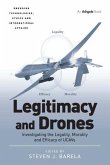"In this book the authors examine how the frameworks of intellectual property law shape the ways states create, acquire, and transmit defense technology. They begin by detailing the unique interface of state security concerns with intellectual property rights, with particular focus on patents and trade secrets. A comparative historical analysis traces the differences between American and Soviet approaches to military intellectual property during the Cold War, studying the benefits and drawbacks of each, and illustrating the ways that ideologically informed property regimes cultivated innovation, and contributed to control and diffusion of military technology. They then look at more contemporary policies about military technology and disputes between the United States and South Korea as well as between the Chinese and Russians over allegations of "stealing" military technology. They argue that the efforts of the Americans to protect technology through the intellectual property system might in fact assist other countries in obtaining critical technology"--
Hinweis: Dieser Artikel kann nur an eine deutsche Lieferadresse ausgeliefert werden.
Hinweis: Dieser Artikel kann nur an eine deutsche Lieferadresse ausgeliefert werden.








